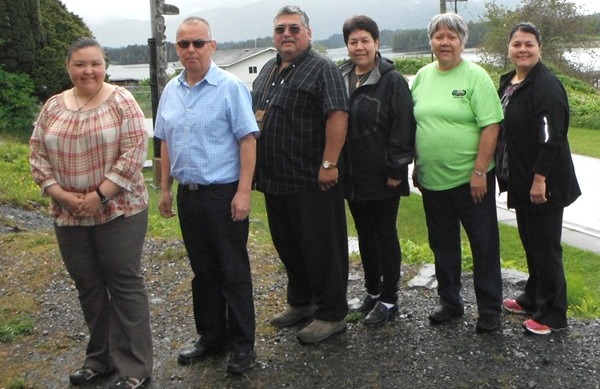Members of the Metlakatla First Nation Community near Prince Rupert, BC who collaborated with an international team of scientists in a genetic study of aboriginal people, including excavated remains that link them to their 5,500 year old Grandmother. Photograph/handout courtesy of the Metlakatla Treaty Office.
Over the past decade or so, there has been a lot of debate about tribal participation in DNA testing. Without getting into the politics of the situation which is deep and dangerous water, many tribes see absolutely no possibility that DNA testing could help them, and a significant potential that it might hurt them, one way or another.
For example, we know that the Eastern tribes were heavily admixed with Europeans quite early and we know that the Southwest tribes are equally admixed with the Spanish. Yet, they are still Native tribes, carrying on the Native customs and cultures, including their own creation and other sacred stories.
Let’s say that a few tribal members test, and their DNA turns out not to be Native, but is European, or African. Granted, the DNA would only be representative of one genealogical line, either the direct paternal (surname) line for males and the direct maternal line for both males and females, but still, if you expect Native and you get something else – it could be bothersome, and perhaps troublesome. Add to that a historical situation filled with distrust for a government that routinely broke treaties and you have a situation where tribes would just as soon not open Pandora’s box, thank you very much.
However, not all tribes think this way. For the past several years, people from Canada’s First Nations tribes have been working with scientists not only to test their DNA, but that of their ancestors as well. Recently, a paper was published detailing the findings, but those findings didn’t really say much about the effects of the results on the currently living people and tribes involved.
The Vancouver Sun recently carried a human interest story focused on the Metlakatla First Nation Community and the people who were found to be related to the 5,500 year old bones that DNA was extracted from.
The people involved who descend from either this woman or a common ancestor with her are thrilled to be able to make that connection from some 220 generations ago, to be able to honor her as their Grandmother, and the connection cements the fact that these people’s ancestors were indeed on this same land at least 5,500 years ago, not far from where they live today.
This kind of information has great potential to help the tribes involved with land claims and treaty rights. These deep rooted links to the region simply cannot be denied. So the First Nations people stand to benefit, the people who match the Grandmother are thrilled, science benefits and they have the ability to confirm their own stories told by the Ancestors for centuries, indeed, for thousands of years. Sounds like a win-win situation to me.
Congratulations to these First Nations people for this wonderful link to a Grandmother, for their brave participation and leadership role in scientific study, and for not being afraid of finding the truth, whatever it is. The Ancestors would be proud of you!


Roberta,
This was a wonderful result. You are so right about our doubts and confidence in the government. For me, that is the biggest concern, not whether I won’t find Indian blood, or maybe have some African blood. What it is, it is! In my opinion, if a person has lived and died in a community of relatives who were their tribe, it doesn’t concern me at all, considering many white people were adopted into tribes and considered “a brother” without any hesitation. Some were called such just for doing a good deed. When people have a consistent cohesiveness with a group they are a tribe.
As for the Canadians, a friend of mine visited there recently among the indigenous people, and was impressed by the term “First Nation” that they use. I think that might be a good idea for us here in America.
Roberta,
This is the kind of news we really want to hear. I so wish my cousin would do her Mtdna so we could prove an Indian lineage. I think she is only female left that is direct link. She so afraid someone may learn something medical. Alas, we should all want to learn medical for personal and family use. I truly believe in it to save our selves and famiies agony not needed or to be prepared for it.
Grandmother’s Grandmother was Indian. She taught Grandma many things when she was young. Grandma shared much with me but I was much younger and need hypnotized to remember all the things she said. But we use some of the handed down treatments.
Susi
Pingback: 5,500 Year Old Native Grandmother Found Using DNA - 500 NATIONS | 500 NATIONS
I think Angie hit the nail on the head with this one. Keep up the great work Roberta!
Margaret Speaks Waters
What a beautiful and proud group of people in the photo above. Bravo to all of you for participating in this exciting breakthrough, and thank you Roberta for reporting it!